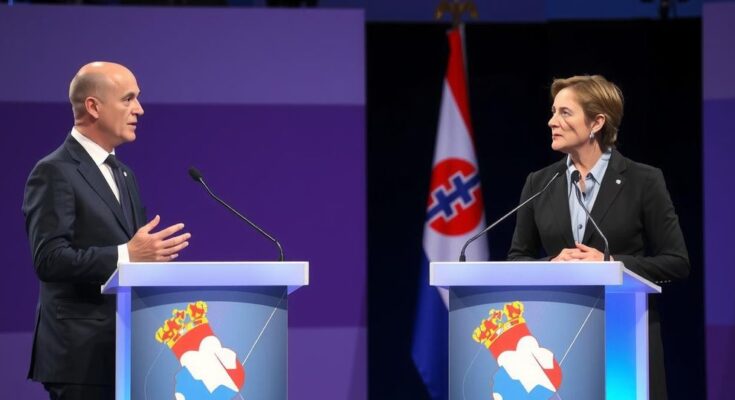Croatia’s President Zoran Milanovic will face conservative rival Dragan Primorac in a run-off election after neither candidate achieved the required majority in the first round. Milanovic secured 49.11% of the votes, while Primorac received 19.37%. This election highlights critical national challenges, including inflation and corruption, amidst a long-standing political rivalry that may influence the future governance of Croatia.
In the upcoming election run-off, Croatia’s incumbent President Zoran Milanovic will compete against conservative candidate Dragan Primorac. Milanovic, who narrowly missed securing an outright victory with 49.11% of the vote in the first round, represents the opposition Social Democrats. Primorac, associated with the ruling HDZ party, garnered 19.37%. This election unfolds amid significant national issues including inflation, corruption, and labor shortages, raising concerns for the current government led by Prime Minister Andrej Plenkovic.
The presidential position in Croatia, although limited in formal powers, is perceived as a critical player in maintaining the political equilibrium in a country dominated by the HDZ since its independence. Milanovic’s tenure has been marked by his bold and sometimes controversial rhetoric against both political adversaries and EU officials, alongside his critiques of systemic corruption in the current administration.
As they prepare for the run-off, the political rivalry between Milanovic and Primorac highlights broader themes of national governance, with the former framing himself as a defender of democracy against perceived threats posed by the current leadership. Primorac, on the other hand, appeals to voters with messages of unity and stability in an increasingly polarized political landscape.
The election is not merely about the candidates but reflects deep-seated issues within Croatian governance, including rampant corruption and economic challenges as the nation navigates its role within the European Union and NATO. The outcome of this run-off could significantly shape Croatia’s political future.
The political landscape in Croatia has long been influenced by the dominant ruling party, the HDZ, and the competitive challenges from other political factions such as the Social Democrats. The presidency holds influential sway over foreign policy and the armed forces, making this election pivotal in steering the country towards either a continuation of the HDZ’s policies or a shift towards a more leftist agenda under Milanovic. The nation is currently grappling with economic turbulence, including inflationary pressures and high levels of corruption, which have fueled public discontent and electoral volatility.
The impending run-off election in Croatia, pitting incumbent Zoran Milanovic against Dragan Primorac, underscores significant national concerns regarding governance and integrity. With Milanovic representing the leftist opposition and Primorac aligned with the ruling conservative HDZ, their confrontation will not only determine the presidency but will also reflect the electorate’s stance on pressing issues such as economic stability and corruption. As citizens approach the polls, their choices will be crucial in shaping Croatia’s political direction at a time of great uncertainty.
Original Source: www.dailygazette.com




